Julaspium
Kuras | Medec | Osannia | Pylatea | Servator | Trenium | Valorian
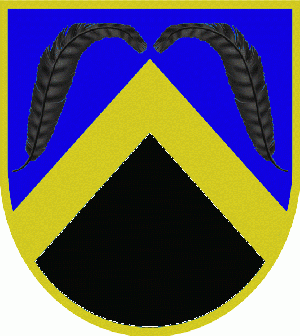
For more information, please PM Krator
The Grand Duchy of Julaspium
Current Lord: Chancellor Krator Blackfist, Duke of Soreign
Capital: Soreign
Fief Alignment: Lawful Neutral
Major Faiths: Senath, Hurine, Toran
Population: 9,000,000; 80% Kurathene Human, 10% Wemic, 1% Elf, 9% Other.
Trade: Exports: Beer, Bronze, Carpentry products, Luxury Goods (Perfume, Clothing), Tools. Imports: Corn, Iron, Sugar.
Trading Partners/Alliances: To be decided IG.
Standing Army: Julaspium Army (200.000), led by The Order of the Gauntlet.
Coat of Arms: Gold Chevron with chief blue, base black, with two mirrored feathers displayed on chief.
Information
History
This timeline begins where the Kurathene Timeline ends.
2000: Chancellor Regnar Thrardoldich the Great is elected by the Council of Cities that ruled Julaspium from the end of the Second-Tri Fief war, to reclaim properties lost in that war.
2001: Chancellor Regnar Thrardoldich the Great conquers Clairvont, reclaiming one of the major former Sorrainian cities. Imperialist factions in Julaspium move to Clairvont, with the Cattone family, a recently returned family who fled Julaspium in 1881, taking the lead.
2015: Chancellor Regnar Thrardoldich is assassinated by Merenasi Assassins after marrying the daughter of Lord Michael Merenasi IV, duke of Halvia, without her father's permission. The Council of Cities then appoints Drolios va'Argos as Chancellor of Julaspium.
2018: The Council of Cities accepts the Military Rule Law, basically martial law, after revolts in Soreign, Clairvont and Llargos.
2025: When the Military Rule law formally ends, Chancellor va'Argos disbands the Council of Cities and claims the title of Duke of Soreign, the title the former Prefects of Sorraine always had.
2026: Council of Cities is reformed, but is more of an advisory council now, instead of the ruling power. Chancellor va'Argos now has absolute power.
2030: After Four years of relative peace, va'Argos dies and the relativly unknown noble Lord Aeoil va'Lasor from the city of Arlasdor was appointed by Chancellor va'Argos as his successor. Aeoil, unexperienced, and not trusting the Council of Cities to rule Julaspium, summoned the Dukes. (Duke of Clairvont, Duke of Llargos, Duke of Halvia, and himself, Duke of Soreign) He gives them the rule for their own duchy, but only in infrastructural and agricultural matters, forcing them to disband their armies.
2032: In a major battle between Arvanos and Crullath, Julaspium forces aid Arvanos in an attempt to create a more friendly relationship between the two fiefs. Julaspium forces didn't play a major role in the battle, being very few in number, but a group of knights who were the bodyguards of the Julaspium Commander, save his life when battling against a Crullath Strike force. Aeoil creates the Order of the Gauntlet to honor the few surviving Knights.
2050: Aeoil reforms the military, knighting all generals and marshalls in the Order of the Gauntlet, and making the Order the commanders of the Army.
2051: Aeoil dies. One of the major members of the Order of the Gauntlet, Knight-Lieutenant Jaspar I Thrardoldich is succeeds him.
2052: Combined raids from wemic barbarians and long rains ruin the harvests for this year. Merenasi and Nordryn families sell all their farms they own to the farmers who previously rented the farms from them. Without the community tools and support, many starve. To make sure such an unexpected agricultural revolution doesn't happen again, Jaspar I makes a law which makes it impossible for nobles to own food producing farms.
2076: Jaspar I becomes senile and is succeeded by Lord Bartholomeus "Blackfist" Merenasi.
2077: Bartholomeus turns out to be a brilliant general and succesfully fights the wemics in the southeastern steppes.
2080: Bartholomeus disbands many soldiers reforming the entire military: Instead of a large military mainly consisting of not trained peasants, he now makes the Julaspian army a small but well trained military.
2081: While the nobility and merchants are now very rich, Julaspian state goes bankrupt. More taxes come.
2108: The very old Bartholomeus dies, and he appointed his most trusted advisor, Councilor II Jaspar Thrardoldich (member of the council of cities for Soreign), as his successor.
2130: Jaspar II is dying. He became very paranoid in his last years, not trusting anyone but his favorite general, Knight-Commander Lord Holben Nordryn. He really wanted him to become the next Chancellor, but that was impossible because there are strict laws to seperate the military from the Chancellor. He thought all the other potential candidates not fit as he did not trust them. Jaspar II then appointed the long-gone grandson of Chancellor Bartholomeus "Blackfist" Merenasi, Krator Blackfist (Internal problems in the Merenasi family had seperated it into two branches: the larger Merenasi branch and the offspring of Bartholomeus, the Blackfist family.), as his successor, and General Holben as Governor of Julaspium to rule until his return. This way he could still give Holben the absolute reign over Julaspium, without angering the other families.
2144: Imperialist Toranite factions seek Krator in Southern Avlis, upset with Holben's Senath-inspired rulership. They will get quite a surprise....
Geography
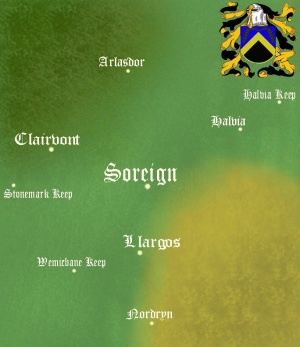
Julaspium is a large fief without any landmarks like rivers, mountains, or coastline. It’s lands are the rolling plains and hills which are so common in the Kurathene empire. There is a minor river, flowing from the capitol Soreign to the river Nomad in the east. It is called the Koeron, which is the name the wemics from the SE plains gave the river, meaning lazy/slow/old water in wemic. The far north of Julaspium is quite cold, and not inhabited. With clever tactics and with much digging and building, Julaspium has recently dug tunnels and trenches under the soil, (a bit resembling a bunker), using special-built arbalests to fire balls of fire to the enemy from their safe position. It also makes it difficult for the enemy to estimate the numbers of the Julaspii, which are very low. (see: Military).
Cities and Towns
Arlasdor
The smallest of Julaspium's walled cities, Arlasdor, is reknown for it's mundane or slightly enchanted jewelry. Because of the proximity of The Forest of Arlasdor, it is one of the major carpentry centers in the Kurathene.
Arlasdor is home to a relativily large number of Elves, who were attracted as tutors in jewellery and carpentry by the Arlasdorians. The worship of Dra'Nar is also quite big in Arlasdor.
Arlasdor is mainly controlled by the Eloras family.
Clairvont
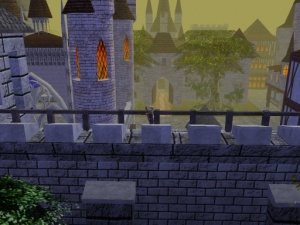
Clairvont is an ancient city, the home of the former Prefects Sorraine, the Clairvont family.
The University of Clairvont is the best University of the Kurathene Empire, especially in the fields of theology, geography, and languages. The library, owned by the University, contains one of the largest book collections of the Kurathene Empire.
Clairvont is mainly controlled by the Cattone family.
Halvia
Smallest of the towns of Julaspium, Halvia and it's surrounding lands of the east are the only real farmland and agriculture areas of Julaspium, growing many different crops.
Halvia is mainly controlled by the Merenasi family.
Llargos
Llargos is mainly a mining town, and includes most of the businesses the nobles from Soreign don't want to have in their clean city.
Llargos is mainly controlled by the va'Argos family.
Nordryn
Nordryn is known for it's baths and hot springs, and it's extravagant clothing, having many nobles from all over the former Empire as visitors.
Nordryn is is mainly controlled by the Nordryn family.
Soreign
Soreign is the capitol of Julaspium. Main features include the Duminas Academy of Swordsmanship: Soreign Branch in the Northwest; The Chancellor's Palace in the Northeast; The Temple of Senath in the Northeast, and The Temple of Toran in the south.
Economy
Unlike most fiefdoms, only a small portion of the Julaspian commoners lives as a farmer. Instead, many are craftsmen, usually working for one of the many businesses around Julaspium. This is reflected by the large number of urbanized areas in Julaspium, including four walled cities and two quite large towns. About 50% of the Julaspium population of about 9 million souls lives in a city or non-rural town. (See:Geography) Julaspium crafted products are shipped all over Kurathene, and a large portion of Avlis, and Julaspium brands are known for their quality.
The Julaspium economy can generally be split into three parts, the three economic sectors: first, agriculture, second, the processing or crafting of agricultural products to final products, and third, service and trade. While most of rural Kurathene is working in agriculture, Julaspii can usually found in the second. Examples here include making clothing of Calazerian cloth and silk, making tools, weapons and armour of Deglossian ingots, and making beer of the own hops and grain.
Some rough numbers would be, in percent of the total labour force: Agriculture - 30%, Crafts - 50%, Service - 20%.
Food-Producing Agriculture
An interesting part of the Julaspium agriculture is that the nobility may not own any farming land growing fundamental food products, which includes wheat, corn, cabbage, etc, but not stuff like rosemary, hops, Andarran tulips, Angel's Tears.
This law (usually referred to as the 2052 Agriculture Law) was made in 2052 (See: History) when the actions of the nobility ruined that year's harvest, as the nobility sold their farms (because their value was expected to drop) to people who couldn't handle operating one without the community tools and education previously provided by the owner of the farm.
Nowadays any food is brought to the nearest market (which usually isn't far away) by the farmer himself, and directly bought by those who want it, without any intervention of nobility. The 2052 Agriculture Law is one of the few strictly enforced laws in Julaspium. Penalty for violating it: Death, as always.
Other Agriculture
Most other farms are indeed owned by nobles - only few independant farmers dare to put their nonfood agricultural produce on the market. Even fewer of those still own their farm the next year. Farms owned by nobles usually produce for companies owned by the same Noble House, or, in case of expensive or rare plants, for export.
Non-farming first sector economical activities make up only a tiny part of the economy, but nontheless are notable enough to describe here.
Fishing and hunting are almost nonexistent, perhaps only a few nobles practise it in the Forest of Arlasdor for entertainment. Logging, however, is done a lot, and can roughly be divided in two main activities.
First is cutting down trees for common targets like construction and fuel. This is mostly done by small companies owned by the Eloras Noble House. Second is more high quality woods for the construction of bows, weapons, tools, and key beams in construction. This is mostly done by professionals who live near the forest and is a relativily small, but lucrative, business.
Crafting and Processing
Most of the Julaspium citizens work in this sector. Although mostly concentrated in the cities of Soreign, Llargos, Nordryn, and Halvia, some of the business of this sector, especially the foul smelling kind, happens in more remote regions of Julaspium.
While this sector is too large and too diverse to describe every facet of, a few examples of crafts in Julaspium are: The brewing of beer, the tailoring of clothing, and the melting of bronze.
There is something specific that needs to be mentioned: The arms and armour industry. All gear used by the Julaspium army is made inside Julaspium itself, mostly using Kurathene Bronze mined in the Llargos mines. However, there still is a surplus. Not wanting to supply any possible enemy with weapons, permission from the Chancellor himself is needed to sell weapons to other fiefdoms.
Military
| Common Ranks Pikeman Archer Sergeant |
Noble Ranks Knight Knight-Lieutenant Knight-Commander |
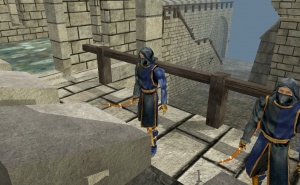
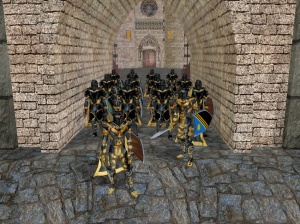
The Army of Julaspium has severed any ties with the old Imperial military system, and has introduced completely new training methods, uniforms and ranks. This makes the Julaspium army somewhat unpredictable for the less-informed enemy. There are two sections of the army: Common Troops and Noble Troops. The division is about 40% Commoner and 60% Noble, for a relativily small army of about 200.000 troops.
Most Julaspium Knights who were born Julaspian are trained in the Duminas Academy of Swordsmanship, Soreign branch, but most common knights are not from Julaspium, but instead mercenaries who enlisted officially or soldiers recruited in the Seven Cities and other fiefdoms.
The Julaspium Army is Led by the Order of the Gauntlet. (Ordo domus Praetoris Lasoricorum Iulaspiorum, "Order of the va'Lasor House of the Chancellor in Julaspium") That order was founded upon the remnants (a few hereditary titles and some elven survivors) of the Order of the Javelin in 2030.
Demography
One of Julaspium’s most striking features is the lack of population. Plagues and wars reduced the peasant population greatly, disturbing the relation between the peasant population and the number of patricians. Before, it was 10% nobles 90% peasants, now it is more like 30% nobles 70% peasants. This means there are relativily more nobles, and thus the average Julaspian is quite rich. Immigration to Julaspium is neigh-impossible; you only make a chance by being adopted by a noble family, or being invited by the army. (Many of the brilliant generals Julaspium had were in fact from the seven cities or other fiefs, but went to Julaspium tempted by the gold offers) Currently the population is recovering to normal levels.
All current noble family lines, except for the va'Argos and Cattone, were founded after the Revolution, and almost all were merchants in Kuras, Kalion or Julaspium. They were made nobility in Julaspium after the defeat in the second Tri-Fief war, when the revolutionairy government was replaced by one that resembled the old system more. All those rich merchants brought lots of new money to Julaspium which was mostly invested in building up the fiefdom again.
Julaspium is very tolerant towards other races except dwarves, whom are looked upon with suspicion. Elves are liked, and people see Halflings as weird little humans. Half-Elves or humans with some elven blood are common, as the elves are masters in many crafts the Julaspii perpetrate, and thus the Julaspii seek out elves to teach them. However, any race that starts becoming a problem, seems to be fanatic or nationalistic, or causes trouble, can expect the army to take action. Last time this happened, when a couple of Nanshi elves came to recruit elves living in Julaspium for the nanshi army, all elves involved were found guilty of treason. (see: Politics)
Wemics have a strange status aparte in Julaspium: A treaty exists between the tribes of the southeastern plains and the Julaspium state, which basically means that Julaspium will allow the wemics to live on their plains and will not attempt to take the area for cultivation. This treaty also limits the number of wemics allowed to become warriors, to prevent the tribes from becoming a threat to the populace of Julaspium. To partly circumvent this law, a significant number of wemics are serve in the army. Julaspium commoners don't really care about wemics, unless they can employ them for the heavy jobs on the farm or in the mines. The nobility thinks of them as filthy beasts, unless they are sophisticated (scholars, advisors to other nobles) or serve in the army, then they are suddenly a curiosity and looked upon with some degree of respect.
Politics
Julaspium is ruled by the Chancellor, wielding absolute power. The laws are strict and can only be changed by the Chancellor. The others wielding power because of the law are two Dukes, who have neither military nor much economic power, but simply coordinate a piece of land for the Chancellor. This means, that they build and keep the infrastructure, and they oversee all the farming. Although they lawfully don’t have much power, in reality these dukes are often the head of the most powerful noble families, who control the rest of the economy. (Anything not farming or infrastructure related falls under ‘rest’: most of the economy) These families resemble the Ziabatzu in japan in the middle of the 20th century, or the Medici family in Milan in the renaissance, or the mafia today. It is not that they have the god-given right to rule like traditional medieval nobility, no, they are just clever merchants who have such an influence on the daily life in Julaspium that they have some political power.
That political power is the Council of Cities. This name is just a cover up; because it isn’t true that all cities in Julaspium have one seat in that council. No, it is more a council of all noble families of Julaspium and is an advisory organ. In reality the Chancellor almost always listens to their advice on economical things. They rarely gather however, and the Chancellor gets advised by specific families who have much interest (the most) in the area the Chancellor has a decision to make. For example, if He is making a decision to start digging another Mithril mine, he gets advised by the head of the noble family who owns the most Mithril mines and smiths.
There is one form of punishment in Julaspium, and that is the death penalty. That is because there is very little criminality in general, because there everyone is quite wealthy. However, assassination and murder are common among the noble families, but the Julaspium Court is incredibly bureaucratic. It takes at least one week (RL) for a case to come for the court, and even then it is unlikely that one is being found guilty, because the noble family he belongs to had the time to assassinate all witnesses. A special case is made for when you are caught on scene by a member of the army.(Julaspian army serves as guard and police too, except in the cities where there is a citizen militia – any citizen who belongs to the militia has the same rights as an army member when enforcing laws in his home town.) You are guilty instantly, and must undergo the punishment as soon as possible in front of one other army member, a noble, a peasant, and a foreigner (from another fief). One of your possessions will be added to the state’s coffers. If you are being returned to life, you have to serve in the army for a month (RL), to get your money and item back, after permission from your commander during that month.
This might seem a bit harsh, but there isn’t much criminality, and all assassinations are being done by highly skilled and trained assassins.
Noble Houses
Julaspium Noble Houses: va'Argos | Boreas | Cattone | Eloras | Merenasi | Nordryn | Thrardoldich
Nobility and Chivalry have lost their elite and leading function in Julaspium, instead being more indicators of reputation, skill (in the case of Knights), and economic wealth. The only noble titles with any real meaning apart from the characteristics summed up above, are the three Dukes (The Duke of Halvia, Duke of Clairvont, and the Duke of Llargos) and the Chancellor (also called the Duke of Soreign, or The Fourth Duke.) There is also the Prince or Arlasdor, a rather minor noble title without any true meaning. The only group respecting the title of Prince much is the Elven community within the forest of Arlasdor.
Other minor titles include Count of Stonemark, Steward of Halvia Keep, Baron of Wemicbane Keep, and Baron of Nordryn.
There are seven major noble houses in Julaspium, which make up over 75% of all nobles. There are other noble houses, but most other nobles are small families consisting of 2-5 people who obtained noble status by either buying it, or being awared a title by one of the Dukes or the Chancellor himself.
Religion
The common folk of Julaspium is very pragmatic: they follow and pray to whichever god suits them at the moment. They rarely follow or pray to the more abstract Greater Gods, instead following a lot of the lesser ones. Farmers generally worship Berryn during spring, Yeraiah during summer, Hurine during Autumn, and Toran, Mikon or Dagath during winter. The deity of other commoners depends on their profession.
Nobles worship other deities, and that differs much by family. Each family reveres Senath, Hurine and Toran in some way. The different gods are, in short per family: Boreas worships Valok, Thrardoldich mostly Toran, Eloras either Dra'Nar or Skern, Merenasi mixed, Nordryn mostly Hurine, va'Argos sometimes Fegall, but mostly Hurine, and Cattone almost exclusivily Toran.
People
PC
| Rank: Chancellor Knight-Commander Knight-Lieutenant Knight Footsoldier |
PC: Duke Krator Blackfist Sir Samuel va'Argos Lady Terra Swift Father Theodoric va'Reine None yet. Sir Jurak Cattone Sir Lorik Merenasi Lady Khaelindra Al'Cosack Nico Cattone |
NPC
Prince Frederick Eloras (NPC)
Prince Frederick Eloras was the Prince of Arlasdor during the last two decades of the reign of Chancellor Jaspar II, and during most of Holben Nordryn's governorship. He was not the brightest, but with his great charisma he separated himself from the other squires at young age, and he joined the army soon after growing up. After his father died peacefully, he inherited the title of Prince of Arlasdor, which is about the same as one of the Dukes (Llargos, Halvia, Clairvont).
After a short trade trip to Mikona he saw so much suffering among the children, that he converted to Dra'Nar (Became weak of heart, according to the Thrardoldich), a deity which had already a small but faithful following in Arlasdor. With the construction of the wooden temple up in the Forest of Arlasdor, the worship of Dra'Nar boomed in and around Arlasdor. Frederick himself lead several successful military campaigns, always relying on his generals for strategic advice, he usually charged the enemy himself. Whether he was a good fighter or just lucky is unknown.
Prince Frederick was also known as a womanizer, and he was the most desirable man for any Julaspium woman for a long time. During his reign as prince the Eloras Keep got expanded with several small, secluded towers, where he spent many nights with his mistresses.
At later age he married Lady Alicia Eloras-Merenasi, the most desireable woman of Julaspium for a long time, and got a son: Nemo Eloras.
Currently it is unclear whether he's dead or alive: Lady Alicia says he's alive but ill, and many young idealists who follow his ideals of Dra'Nar believe that. The army also officially supports this opinion as it increases morale.
Lady Alicia Eloras-Merenasi (NPC)
Firstborn Daughter of the Merenasi family, she was married to Lord Bartholomeus Blackfist Jr. at young age, in an attempt to seal the internal rift in the Merenasi family Lord Bartholomeus "Blackfist" Merenasi Sr. had caused. She gave birth to a son, Krator, who was expelled to the Seven Cities at young age, and Bartholomeus Jr. died soon thereafter. As single, she became the most desirable woman in Julaspium, because she was still attractive, despite being a widow and mother.
A lesser known secret about Lady Alicia is that she is a sorceress, and she mainly use her magics this to keep her physical appearance seem nice. There are also some rumours about her worshipping Kelvos, or even Valok.
She remarried to Prince Frederick, and gave birth to his son Nemo, Krator's half-brother. Currently she lives in her tower in Eloras keep, not leaving it for weeks, pretending to take care of Frederick.
For more information, please PM Krator